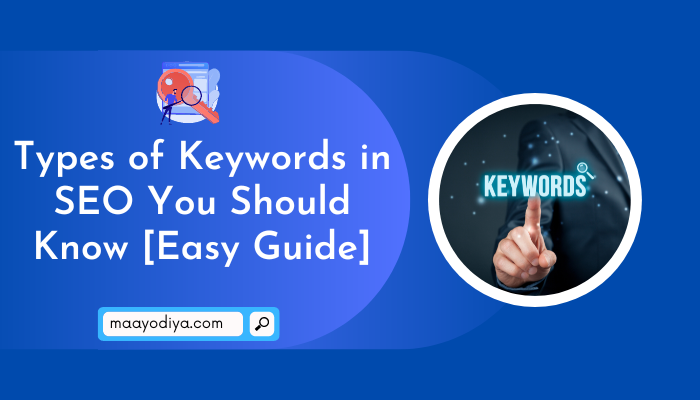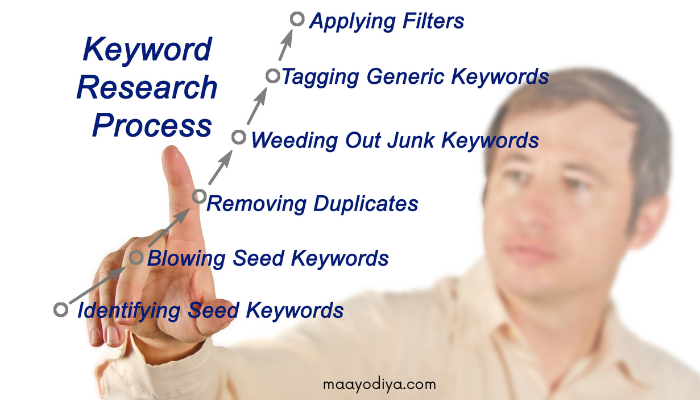
Do you want to know the types of keywords in SEO? You will find out in this article the best keywords to use and how they can help your website. Keywords are a very important part of SEO and knowing what they are is crucial for success.
What is Keyword Research?
If you’re new to SEO, you might be wondering what keyword research is and why it’s so important. The process of choosing the best keywords to target for your website or blog is known as keyword research. The right keywords are those that are most relevant to your business and have the highest search volume. Targeting the right keywords can help you attract more visitors to your site, improve your search engine ranking, and get more leads and sales.
If you’re a business owner, chances are you’ve heard of SEO. Search Engine Optimization is the process of optimizing a website to rank higher in search engine results. A big part of SEO is using the right keywords.

Types of Keywords in SEO
There are different types of keywords that you need to know about when it comes to SEO. Here is a quick guide on the different types of keywords and how they can help you improve your ranking on search engines.
- Short-tail keywords: These are one- or two-word phrases that are very specific to what you’re selling. They have high search volume but are also very competitive. Examples of short-tail keywords include “red shoes” or “buy iPhone.”
- Long-tail keywords: These are three- or four-word phrases that are more specific than short-tail keywords. They have lower search volume but are easier to rank for. Examples of long-tail keywords include “red shoes size 8” or “buy used iPhone.”
- Local keywords: These are keywords that include a location, such as a city, state, or country. They’re great for businesses that targeting any particular location. Example of local keywords include best digital marketing institute near GTB Nagar.
- Negative keywords: These are words or phrases that you do not want add to show up for. For example, if you sell men’s clothing, you would add women but it’s not good for SEO. Your site will get high bounce traffic and low conversation rate.
- Brand keywords: Brand keywords are simply the name of brand like NIIT, Jio etc.
- Product keywords: Product keywords are keywords that describe a product or service that you offer. They’re great for ecommerce websites and businesses that offer specific products.

How Do You Choose the Right Keywords for SEO?
Choosing the appropriate keywords is critical when it comes to SEO. But with so many different types of keywords out there, how do you know which ones to use? In this easy guide, we’ll break down the different types of keywords and how to choose the right ones for your SEO strategy.
→ Broad match keywords are the most basic type of keyword. They are simply the words or phrases that you want to rank for. For example, if you’re a travel blog, some broad match keywords could be “travel,” “vacation,” or “travel tips.”
→ Phrase match keywords are a bit more specific than broad match keywords. They are usually two or three word phrases that must be used in order, such as “cheap travel insurance” or “best travel credit card.”
→ Exact match keywords are the most specific type of keyword. They are usually just one or two words, and they must be used in exactly that order. For example, an exact match keyword for a travel blog could be “cheap flights.”
If you’re not sure which type of keyword is right for your SEO strategy, start with broad match keywords. These will give you the widest net to work with and allow targeting much things.
Also Read: Difference Between HTTP and HTTPS

Conclusion
In conclusion, understanding the different types of keywords is essential for any business trying to improve their SEO strategy. By focusing on the right keywords, you can ensure that your website is visible to the people who are most likely to convert into customers. If you’re not sure where to start, you can join Maayodiya Digital Marketing Academy’s best digital marketing course. This course can help you develop a keyword strategy that will help you achieve your desired results.
FAQs: Types of Keywords in SEO
What are short-tail keywords?
Short-tail keywords, also known as head terms, are broad search terms typically consisting of one to two words. They generally have high search volume but also high competition.
What are long-tail keywords?
Long-tail keywords are particularly more precise and frequently contain three or more words. They tend to have lower search volume but higher conversion rates due to their specificity.
What are LSI keywords?
Latent Semantic Indexing (LSI) keywords are terms that are semantically related to the main keyword. They help search engines understand the content’s context and improve SEO by providing more relevant information.
What are geo-targeted keywords?
Geo-targeted keywords include location-specific terms that target a particular geographical area. These keywords are useful for local SEO, helping businesses attract customers from a specific region.
What are transactional keywords?
Transactional keywords show the user’s mindset of buying or accomplishing some action. Phrases like “buy,” “discount,” or “deal” are common in transactional keywords, signaling readiness to convert.
How can the Maayodiya Academy help with keyword strategy?
Maayodiya Academy offers a comprehensive digital marketing course that can help you develop an effective keyword strategy. By joining the course, you can learn how to identify the right keywords, optimize your content, and improve your overall SEO strategy to achieve your desired results.



Ashwini
February 12, 2024“This blog on types of keywords in SEO is a comprehensive guide for anyone navigating the world of search engine optimization. The breakdown of various keyword types, from short-tail to long-tail, provides a clear understanding of their impact on SEO strategies. A must-read for digital marketers!”
Prasanta
June 19, 2024This contant is very helpful for who is interested in seo